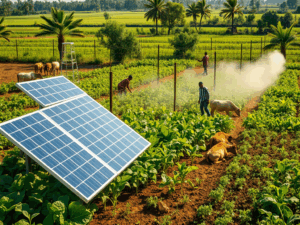Agriculture is the backbone of many African economies, yet the continent faces chronic challenges in ensuring food security for its rapidly growing population. As the demand for food increases, the need for innovative solutions becomes urgent. Public-Private Partnerships (PPPs) offer a strategic pathway to address these challenges by leveraging the strengths of both the public and private sectors. By deepening our understanding of how PPPs can drive agricultural transformation across Africa, including Nigeria, we can chart a course toward a food-secure future that benefits all.
The Role of Public-Private Partnerships in Agricultural Transformation
Public-Private Partnerships are collaborative agreements between governments and private enterprises aimed at achieving mutual goals. In the context of agriculture, these partnerships are pivotal for scaling up operations, improving efficiency, and enhancing access to resources. They allow governments to draw on the innovation and investment capacity of the private sector, while private entities benefit from the regulatory support and infrastructure development facilitated by the public sector.
For instance, in Ethiopia, the Agricultural Transformation Agency (ATA) has been instrumental in bringing together various stakeholders through PPPs. The ATA’s partnership with Syngenta, a global agribusiness company, has focused on increasing wheat production in the country. Through this partnership, Ethiopian farmers have gained access to high-yield seed varieties and modern farming techniques. The result has been a significant increase in wheat yields, reducing Ethiopia’s dependence on wheat imports and improving food security.
Cocoa is a major export crop for Ghana, and the Ghana Cocoa Board (COCOBOD) has been at the forefront of implementing successful PPPs to boost the sector. One notable partnership is with Barry Callebaut, a leading global chocolate manufacturer. Through this collaboration, COCOBOD has introduced various initiatives aimed at improving cocoa production, including farmer training programs, the distribution of high-yield seedlings, and the establishment of infrastructure to improve cocoa processing. This partnership has not only increased cocoa yields but also improved the quality of Ghanaian cocoa, making it more competitive in global markets. Additionally, by improving the livelihoods of smallholder cocoa farmers, the partnership has contributed to reducing poverty in cocoa-growing regions.
Expanding the Conversation: PPPs in Other Parts of Africa
While Ethiopia and Ghana offer compelling examples, other African countries have also seen the transformative power of PPPs in agriculture. In Kenya, the government’s partnership with the private sector has been crucial in revolutionizing the dairy industry. The Kenya Dairy Board has collaborated with Brookside Dairy, the largest milk processor in East Africa, to increase milk production and improve supply chain efficiency. Through this partnership, smallholder dairy farmers have gained access to better veterinary services, quality feeds, and training in modern dairy farming practices. The result has been a marked increase in milk production, improved farmer incomes, and enhanced food security through the availability of affordable dairy products.
The Zambian government’s partnership with private companies in the maize sector serves as another noteworthy example. Zambia has entered into a partnership with Cargill, an international agribusiness corporation, to enhance maize production and processing. This collaboration has led to the establishment of modern maize milling facilities and the introduction of more efficient farming practices. The impact has been substantial, with Zambia becoming a net exporter of maize, thereby contributing to food security in the Southern African region.
Successful Public-Private Partnerships in Agriculture in Nigeria
Nigeria’s Staple Crop Processing Zones (SCPZ) Initiative:
- The Staple Crop Processing Zones (SCPZ) initiative is a flagship program of the Nigerian government aimed at attracting private investment to areas with high agricultural potential. Through the development of infrastructure such as roads, power supply, and water facilities, SCPZs reduce operational costs for private investors, encouraging them to set up processing plants close to production areas. This initiative has seen partnerships with companies like Dangote Group, which has invested in rice processing plants, and Olam Nigeria, which has invested in cassava and tomato processing facilities.
- Olam Nigeria, a subsidiary of Olam International, has been a major player in Nigeria’s agricultural sector. The company’s investment in rice milling and tomato processing facilities has significantly boosted local production. For example, Olam’s rice mill in Nasarawa State is the largest in Africa, processing up to 120,000 metric tons of rice annually. Similarly, their tomato processing plant in Kaduna has helped reduce Nigeria’s dependence on imported tomato paste by processing locally grown tomatoes.
- Babban Gona is another Nigerian agricultural enterprise partnering with the government and private investors to provide smallholder farmers with access to credit, quality inputs, and training. This partnership has enabled Babban Gona to support tens of thousands of farmers, significantly increasing their yields and incomes. The success of Babban Gona’s model has attracted funding from international development organizations and private investors, making it one of the most successful agricultural PPPs in Nigeria.
Strategies for Scaling PPPs Across Africa
To replicate and scale these successes across the continent, African countries must adopt comprehensive strategies that address the unique challenges and opportunities within their agricultural sectors.
- Policy Harmonization Across Borders: African governments need to work together to harmonize agricultural policies, particularly those related to PPPs. Regional cooperation can facilitate cross-border trade, allowing countries to leverage their comparative advantages in different agricultural products.
- Strengthening Institutional Frameworks: Effective PPPs require strong institutions that can manage and monitor these partnerships. Governments should focus on building the capacity of institutions responsible for agriculture and PPP management, ensuring they have the expertise and resources needed to oversee large-scale projects.
- Expanding Access to Agricultural Finance: Access to finance remains a major barrier for many African farmers. Governments and financial institutions should collaborate to develop innovative financial products tailored to the needs of smallholder farmers, such as crop insurance, microloans, and agricultural bonds.
- Promoting Inclusive Growth: PPPs should be designed to benefit all segments of the population, particularly women and youth, who are often marginalized in agricultural value chains. By ensuring that PPP initiatives are inclusive, African countries can achieve more equitable economic growth and improve overall food security.
- Leveraging Technology and Data: The use of technology and data analytics is critical for modern agriculture. Governments should encourage the adoption of precision agriculture, remote sensing, and data-driven decision-making within PPP frameworks. This can lead to more efficient use of resources, higher yields, and better market access for farmers.
Looking Ahead: The Future of Agriculture and Food Security in Africa
As Africa continues to grapple with food security challenges, the role of Public-Private Partnerships in the agricultural sector cannot be overstated. The successes in Nigeria, Ethiopia, Ghana, Kenya, and Zambia demonstrate that when governments and private sector players collaborate effectively, the results can be transformative.
However, the journey is far from over. The future of agriculture in Africa depends on the ability of stakeholders to scale successful PPP models across the continent, adapt to changing environmental conditions, and embrace innovation. The time to act is now. By investing in and supporting PPPs, African countries can ensure a food-secure future, create sustainable economic opportunities, and achieve long-term prosperity.




